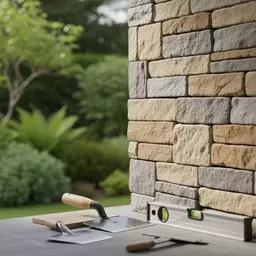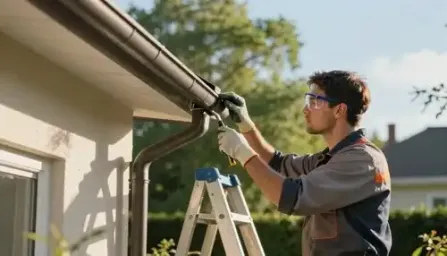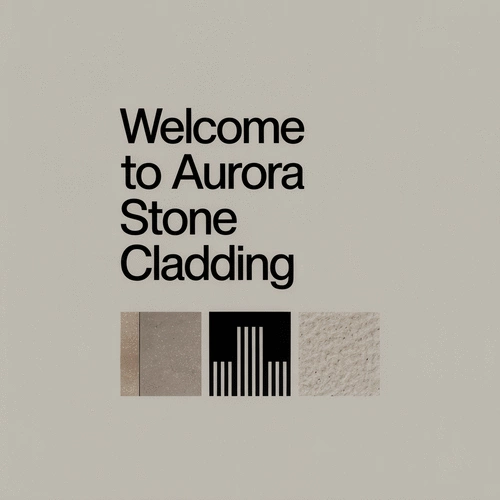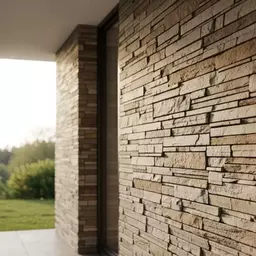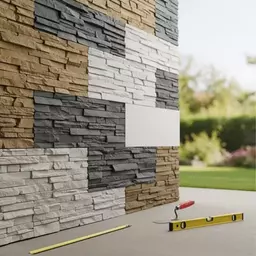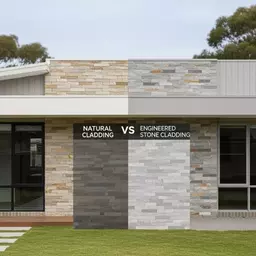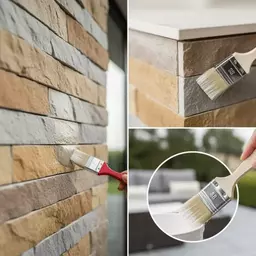Have you ever found yourself entranced by the allure of stone cladding, yet unsure of which type best suits your project? The choice between natural and engineered stone can feel overwhelming, but understanding their unique characteristics can empower you to make a confident decision. Dive into this guide to discover the essentials of each cladding type!
What You Will Learn
- Natural stone cladding offers unmatched uniqueness and durability, suitable for enduring designs.
- Engineered stone provides affordability and extensive customization options, making it a popular choice.
- Weighing the pros and cons of both types can help align your choice with your project's specific needs.
- Eco-friendly options exist for both materials, promoting sustainability while enhancing your space.
- Budgeting effectively involves considering material, labor, and additional supply costs for a smooth installation process.
Natural vs. Engineered Stone Cladding Comparison
This visual offers a side-by-side comparison of the key features, advantages, and considerations for natural and engineered stone cladding, helping in material selection.
Natural Stone Cladding
- ✓ Durability: High
- ✓ Uniqueness: Each piece is distinct
- ✓ Longevity: Decades when maintained
- ✓ Eco-Friendly: Sustainable choice
- ✗ Cost: Higher initial investment
- ✗ Customization: Limited options
Engineered Stone Cladding
- ✓ Affordability: More budget-friendly
- ✓ Customization: Extensive colors & finishes
- ✓ Ease of Installation: Lighter, easier to handle
- ✗ Durability: Moderate, less in extreme environments
- ✗ Maintenance: Moderate
Understanding Stone Cladding: Natural vs. Engineered Options
Choosing the right stone cladding for your project can feel like a daunting task. With numerous options available, it's essential to understand the differences between natural and engineered stone cladding. Each type has its unique advantages and considerations, making them suitable for various applications. Let's delve into what defines each option and how they may fit into your design vision!
Defining Natural Stone Cladding
Natural stone cladding is sourced directly from quarries and consists of materials like granite, slate, limestone, and sandstone. These stones bring a unique, organic beauty that can transform any space, offering a timeless aesthetic that reflects nature's artistry. One of the most significant benefits of natural stone is its durability; it can withstand harsh weather conditions and requires minimal maintenance. For further technical guidance on stone veneer and its installation, you can refer to resources from the Masonry and Hardscapes Association.
- Uniqueness: Each piece is unique, showcasing natural variations in color and texture.
- Longevity: When properly maintained, natural stone cladding can last for decades.
- Eco-Friendly: Natural stone is a sustainable choice as it doesn't require extensive manufacturing processes.
However, costs can be higher than engineered options, and sourcing might require more effort. It's crucial to consider these factors when planning your project!
Exploring Engineered Stone Cladding
Engineered stone cladding, on the other hand, is manufactured using a blend of natural stone aggregates, resins, and pigments. This process allows for a wide range of colors and finishes, making it an attractive alternative for those looking for more control over their design. Engineered stone is also known for its consistency in appearance and often comes at a more affordable price point. For best practices and essential guidelines for stone veneer installation, including both natural and engineered types, the Mason Contractors Association of America offers valuable insights.
- Affordability: Generally, engineered stone is more budget-friendly than natural options.
- Customization: Available in a multitude of colors and finishes to suit any style.
- Ease of Installation: Often lighter than natural stone, making it easier to handle and install.
However, it's essential to note that engineered stone may not offer the same level of durability in extreme environments, so understanding your project needs is key!
Pros and Cons of Each Type
Before making a decision, it's helpful to weigh the pros and cons of both natural and engineered stone cladding. This analysis will guide you toward the best choice for your specific project.
| Features | Natural Stone Cladding | Engineered Stone Cladding |
|---|---|---|
| Durability | High | Moderate |
| Cost | Higher | Lower |
| Customization | Limited | Extensive |
| Maintenance | Low | Moderate |
By comparing these key features, you can better understand what aligns with your vision and practical needs.
Choosing the Right Material for Your Project
When it comes to selecting the ideal stone for your cladding project, consider the following factors:
- Project Purpose: Are you enhancing a residential façade or working on a commercial space?
- Design Aesthetics: What look are you aiming for? Modern? Rustic?
- Budget: What is your budget range for materials and installation?
Taking time to assess these criteria will help you make an informed decision, ensuring that your cladding not only looks great but also stands the test of time.
Popular Stone Types for Cladding: A Comprehensive Overview
As you explore your options, here’s a list of some of the most popular stone types used in cladding:
- Granite: Known for its durability and wide color range.
- Slate: Offers a beautiful, natural texture and excellent weather resistance.
- Limestone: Soft, versatile, and perfect for a classic look.
- Sandstone: Recognized for its warm tones and ease of installation.
This list is just a starting point! Each stone comes with its characteristics, making them suitable for different styles and applications. I encourage you to explore these options further and envision how they will enhance your project.
Pro Tip
When selecting stone cladding, consider the climate of your project location. For areas with extreme weather, natural stone offers superior durability, while engineered stone can be more suitable for milder climates. Always prioritize materials that match your environmental conditions for long-lasting results!
Maximizing Your Investment in Stone Cladding
When investing in stone cladding, it's crucial to weigh the cost against long-term benefits. At Aurora Stone Cladding, I often remind my clients that while the initial expenditure may seem significant, the value and durability you gain can make it worthwhile. Think about it: a quality stone façade not only enhances your property’s curb appeal but also increases its overall value over time. For general requirements for manufactured stone veneer, an important resource to consult is the Masonry and Hardscapes Association's guide.
Consider what you want to achieve with your stone cladding. Are you looking for a stunning aesthetic, improved insulation, or perhaps both? By evaluating your specific needs, you can make a more informed choice that aligns with your budget and goals.
Evaluating Cost vs. Long-term Benefits
Understanding the balance between cost and benefits can guide your decision-making process effectively. Here are some essential factors to consider:
- Longevity: High-quality stone can last for decades, often outliving cheaper alternatives.
- Maintenance: Natural stone requires less maintenance than other materials, saving you time and money in the long run.
- Energy Efficiency: Stone provides excellent insulation, which can lead to lower energy bills.
By looking at these factors closely, you’ll see that the initial investment in premium materials often leads to significant savings and value over time. Remember, choosing the right stone cladding can be a decision that pays off for years!
Choosing Eco-Friendly Options for a Greener Project
As a strong advocate for sustainability, I believe that selecting eco-friendly stone options can positively impact both your project and the environment. Not only do sustainable materials reduce your carbon footprint, but they also encourage the responsible sourcing of resources. Here are some eco-friendly stone choices to consider:
- Recycled Stone: Using reclaimed stone minimizes waste and gives a unique character to your project.
- Locally Sourced Materials: Reducing transportation emissions, locally sourced stone supports the local economy.
- Low-impact Installation Techniques: Techniques that require less energy can enhance your sustainability efforts.
By prioritizing these options, you can create a beautiful, environmentally friendly space that reflects your values. It’s a win-win situation for both you and the planet!
Understanding Installation Costs: Budgeting for Your Stone Cladding Project
Budgeting for your stone cladding project requires careful planning and consideration of various factors. Here are key elements to include in your cost calculations:
- Material Costs: Prices can vary based on the type of stone and where it’s sourced.
- Labor Costs: Hiring experienced professionals may lead to higher upfront costs, but it often ensures quality workmanship.
- Additional Supplies: Adhesives, tools, and sealing products should also be factored into your budget.
By taking a comprehensive approach to budgeting, you can ensure that your project runs smoothly without unexpected financial surprises. At Aurora Stone Cladding, I always emphasize the importance of planning ahead to maximize your investment and achieve stunning results!
Frequently Asked Questions About Stone Cladding
- What is the main difference between natural and engineered stone cladding?
- Natural stone cladding is quarried directly from the earth, offering unique patterns and high durability. Engineered stone cladding is manufactured from a blend of natural aggregates, resins, and pigments, providing consistency, affordability, and extensive customization options.
- Which type of stone cladding is more durable?
- Natural stone cladding is generally more durable, especially in extreme weather conditions, and can last for decades with proper maintenance. Engineered stone offers moderate durability, which may be less robust in harsh environments.
- Is engineered stone cladding more affordable than natural stone?
- Yes, engineered stone cladding is typically more budget-friendly due to its manufacturing process and often lighter weight, which can also reduce installation costs.
- Can I customize the look of my stone cladding?
- Engineered stone cladding offers extensive customization options in terms of colors, textures, and finishes. Natural stone, while unique in its natural variations, has limited customization beyond its inherent aesthetic.
- What factors should I consider when choosing between natural and engineered stone?
- Key factors include your project's purpose (residential vs. commercial), desired design aesthetic (modern, rustic, etc.), budget for materials and installation, and the climate of your location.
- Are there eco-friendly options for stone cladding?
- Yes, eco-friendly choices include using recycled stone, opting for locally sourced materials to reduce transportation emissions, and employing low-impact installation techniques to minimize environmental footprint.
Recap of Key Points
Here is a quick recap of the important points discussed in the article:
- Natural Stone Cladding: Offers unique beauty, durability, and eco-friendly benefits, but may come with higher costs and sourcing challenges.
- Engineered Stone Cladding: Provides affordability, customization, and ease of installation, though it may not be as durable in extreme conditions.
- Project Considerations: Assess project purpose, design aesthetics, and budget before selecting stone cladding.
- Popular Stone Types: Granite, slate, limestone, and sandstone are popular choices, each with unique characteristics.
- Cost vs. Long-term Benefits: Evaluate longevity, maintenance requirements, and energy efficiency to ensure a worthwhile investment.
- Eco-Friendly Options: Consider recycled stone and locally sourced materials to minimize environmental impact.

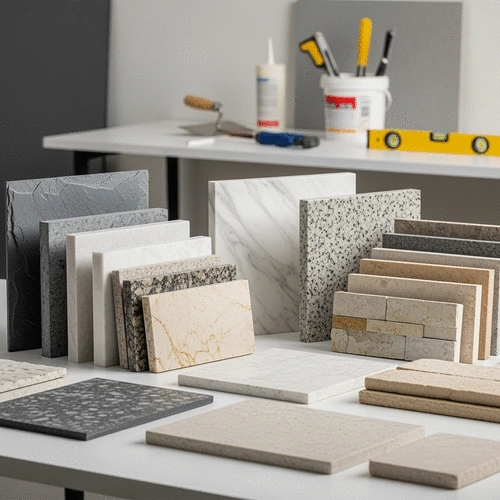
-t.webp)
